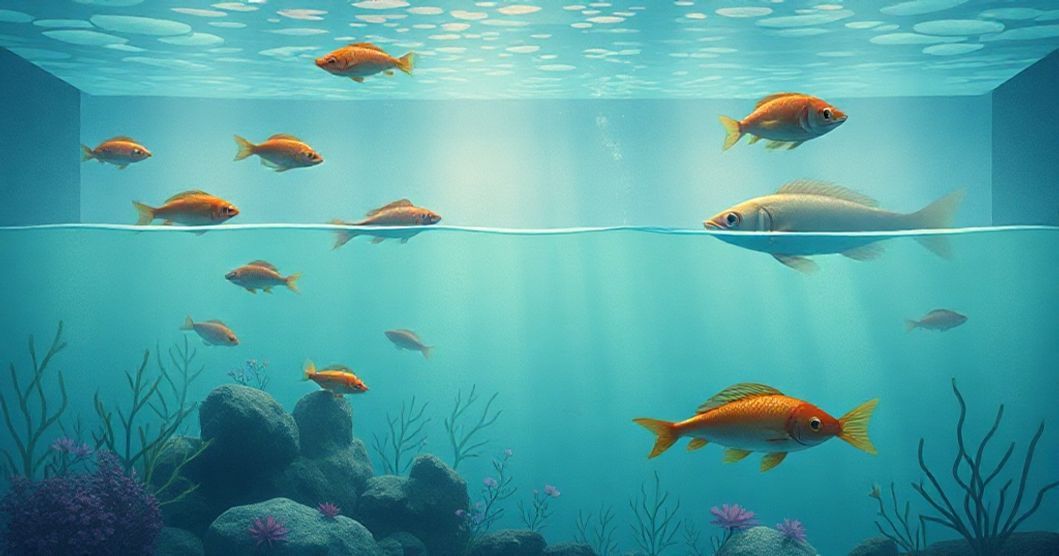Part 1: Dream Presentation
Dreams often carry echoes of our deepest memories and unspoken anxieties, weaving them into surreal narratives that defy logical explanation. Consider this recurring dream experience, which reveals a fascinating interplay between childhood history and present-day emotional patterns:
I’ve been haunted by a recurring dream that feels both deeply personal and curiously disconnected from my waking life. In it, I find myself in a dimly lit room dominated by a large, rectangular saltwater fish tank—its glass smudged, water a murky blue-green that suggests neglect rather than care. The tank sits on a weathered wooden stand, and as I approach, I notice with a sharp pang of unease that there’s no food anywhere nearby: no feeding rings, no packets of fish food, just empty containers and a sense of neglect that clings to the room like a physical weight. I know instinctively this is a saltwater tank, even though I’ve never maintained one in real life—the water’s texture, the faint tang of salt, the way light refracts through it all feel viscerally familiar yet alien. My childhood surfaces briefly: I remember a small freshwater tank with a single goldfish, given to me by my grandmother when I was five, but that memory fades quickly. Without thinking, I reach for a plastic bag containing tiny, silvery freshwater fish—tetras, perhaps, or guppies—and I begin pouring them into the saltwater tank. As soon as they hit the water, I realize my mistake. Their scales glint momentarily before they begin thrashing, tiny bodies struggling against the incompatible environment. I stand frozen, horrified, as I watch them flounder, knowing I’ve caused harm. The tank, designed for saltwater creatures, is now the deathbed of fish I never intended to place there. The dream always ends with me waking in a cold sweat, heart racing, left with the unsettling feeling that I’ve forgotten something crucial. I haven’t kept a fish as a pet since I was five, yet this dream recurs with relentless clarity, leaving me to wonder: why this tank? Why these fish? And why do I keep making this mistake?
Part 2: Clinical Analysis
Want a More Personalized Interpretation?
Get your own AI-powered dream analysis tailored specifically to your dream
🔮Try Dream Analysis FreeSymbolic Landscape: The Mismatched Aquarium
The recurring dream’s core elements—the saltwater tank, freshwater fish, and absence of food—each carry profound symbolic weight that extends beyond literal interpretation. The saltwater tank functions as a powerful metaphor for the container of one’s emotional or psychological environment: its size, neglect, and mismatched inhabitants suggest a space that feels both overwhelming and ill-suited to the dreamer’s current needs. In dream psychology, containers often represent boundaries, self-image, or the holding environment of relationships, and a neglected tank signals underlying feelings of inadequacy in maintaining important aspects of life.
The freshwater fish, meanwhile, embody elements that feel out of place in the dreamer’s life. Their presence in a saltwater environment mirrors the experience of forcing oneself into contexts that don’t align with one’s nature or values—a common theme in dreams of misfit identities. The act of unintentionally placing these fish in the tank suggests a lack of awareness or intentionality in waking life, where the dreamer may be navigating situations without clear purpose or preparation. The absence of food further emphasizes themes of neglect: either neglecting the needs of others (or oneself) or failing to provide the necessary resources for growth and sustenance.
Psychological Undercurrents: Jungian and Freudian Perspectives
From a Jungian framework, this dream reflects the shadow self—the unconscious aspects of the personality that feel alien or incompatible with conscious identity. The saltwater tank, as a symbol of the collective unconscious, contains elements that clash with the dreamer’s
